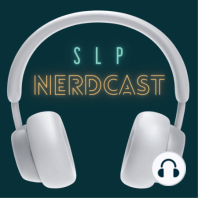20 min listen
Introduction to Dynamic Assessment and Why It is an Essential SLP Tool
FromSLP Nerdcast
ratings:
Length:
61 minutes
Released:
Mar 7, 2021
Format:
Podcast episode
Description
Get .1 ASHA CEU hereEpisode SummaryWhat if I told you that there was a world where your assessment aimed to understand a child's ability to learn and not just what they know right now? There is! And it’s welcoming you, with cake and sandwiches. The field of speech-language pathology has long depended on static, standardized, norm-referenced assessments to diagnose and support intervention needs for children with communication challenges. While these “formal” assessments certainly have their place in our field, research and clinical evidence supports dynamic assessment (DA) procedures as a true game changer. This week’s episode (Part 1 of a Series on DA) challenges us to put down the flip book and test protocol (or at least nudge it over a bit on the speech table) and make room for DA measures that open the door to understanding the way a child learns. Joining Kate and Amy in welcoming the dynamic duo, Dr. Trina Spencer and Dr. Doug Peterson, who share their knowledge and passion about all that DA has to offer clinical practice. This episode has a little something for everyone, including some revolutionary ideas on the validity of DA to answer many clinical questions, perhaps even better than a static measure. Listen in and learn about the differences between outcomes with static and dynamic assessment methods, the pros and cons of each, and some tips and tricks for using standardized DA methods to get stellar data that can offer a wealth of valid and practical treatment planning and diagnostic information. And of course, it wouldn’t be an SLP Nerdcast episode without a food analogy, so tune in for some “cake” and “sandwiches” to satisfy your nerdy assessment appetite. Bon appetit!Summary Written by Tanna Neufeld, MS, CCC-SLP, Contributing EditorLearning Outcomes1. Explain the theoretic basis of dynamic assessment.2. Explain the differences between static and dynamic assessment.3. Describe three dynamic assessment formats that SLPs can use.ReferencesKramer, & Mallett, & Schneider, Phyllis & Hayward, Denyse. (2009). Dynamic Assessment of narratives with Grade 3 children in a First Nations community. Canadian Journal of Speech-Language Pathology and Audiology. 33. 119-128. Peña, E. D., Gillam, R. B., & Bedore, L. M. (2014). Dynamic assessment of narrative ability in English accurately identifies language impairment in English language learners. Journal of speech, language, and hearing research : JSLHR, 57(6), 2208–2220. https://doi.org/10.1044/2014_JSLHR-L-13-0151Peña, E. D., Gillam, R. B., Malek, M., Ruiz-Felter, R., Resendiz, M., Fiestas, C., & Sabel, T. (2006). Dynamic Assessment of School-Age Children’s Narrative Ability: An Experimental Investigation of Classification Accuracy. Journal of Speech, Language, and Hearing Research, 49(5), 1037-1057. doi:10.1044/1092-4388(2006/074)Peña, E., & Iglesias, A. (1992). The Application of Dynamic Methods to Language Assessment. The Journal of Special Education, 26(3), 269-280. doi:10.1177/002246699202600304Peña, E. D., Reséndiz, M., & Gillam, R. B. (2007). The role of clinical judgements of modifiability in the diagnosis of language impairment. Advances in Speech Language Pathology, 9(4), 332-345. doi:10.1080/14417040701413738Petersen, D. B., Chanthongthip, H., Ukrainetz, T. A., Spencer, T. D., & Steeve, R. W. (2017). Dynamic Assessment of Narratives: Efficient, Accurate Identification of Language Impairment in Bilingual Students. Journal of speech, language, and hearing research : JSLHR, 60(4), 983–998. https://doi.org/10.1044/2016_JSLHR-L-15-0426Petersen, D. B., Gillam, S. L., Spencer, T., & Gillam, R. B. (2010). The effects of literate narrative intervention on children with neurologically based language impairments: an early stage study. Journal of speech, language, and hearing research : JSLHR, 53(4), 961–981. https://doi.org/10.1044/1092-4388(2009/09-0001)Ukrainetz, T. A., Harpell, S., Walsh, C., & Coyle, C. (2000). A Preliminary Investigation of Dynamic Assessment With Nati
Released:
Mar 7, 2021
Format:
Podcast episode
Titles in the series (100)
Episode Zero: About & FAQ by SLP Nerdcast
